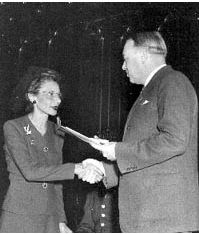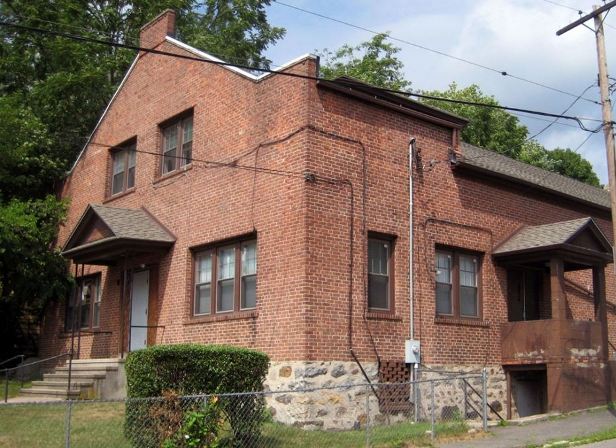On Saturday, November 18, 1944, at noon after the meeting of the Connecticut War Council in the Senate Chambers of the State Capitol, Governor Raymond E. Baldwin, Jr. awarded certificates and Distinguished Service Medals to 10 citizens. One was 14-year-old Donald Anderson of Columbia whose quick actions and bravery saved countless lives at the Hartford Circus Fire of the previous July. Among other recipients was Leila T. Alexander, the only African American receiving a medal. She was from Waterbury and was a member of the Connecticut War Council.
Alexander Honored for Contributions to WWII Home Front
The Secretary of the State Francis B. Redick read the certificate citing Alexander’s service to the war effort. She had devoted “time and energy and ability to maintaining the harmonious relations of good citizenship among various racial and social groups” in Connecticut. Moreover, Redick stated, “It is with a sincere belief of the awards committee…that no person in Connecticut has contributed more richly to developing the tolerance which lies at the very roots of the American tradition than Mrs. Alexander.”

Governor Baldwin awards Mrs. Alexander a certificate and Distinguished Service Medal, November 18, 1944 – Connecticut State Library, The Connector, January 2002
It was fitting that Governor Baldwin handed out this award, for it was during his second term that he established the nation’s first state inter-racial commission. A black-and-white glossy taken of Alexander and Baldwin at the ceremony shows a thin, well-dressed, woman in glasses receiving her award with a friendly smile.
As a member of the War Council, she served on several Council committees including education, employment, advisory, social service, and welfare. In addition, Governor Baldwin appointed her to sit on the Governor’s Advisory Committee on the State Housing Authority as its “Negro representation.” The committee was charged with making recommendations to increase housing in the post-war period.
The Pearl St. Neighborhood House and Formation of Waterbury NAACP
Thanks to newspapers and the Waterbury City Directory, sufficient information was found to know that she was a woman of color of great achievement in Connecticut. Little is known about her before 1924, except that she was born in Canada. In 1924 on Armistice Day, she made a momentous life decision in choosing social work in Waterbury’s North End over a teaching job in Philadelphia. Her post was the Pearl St. Neighborhood House, then in its third month of existence. The mission of the House included the encouragement of good relations between African Americans and “their friends.” Alexander was a widow and she would live at the House and work there as its Director for more than 20 years until her marriage and move to Detroit in 1947.
What is fascinating about the Pearl St. Neighborhood House is that it is on the Connecticut Freedom Trail under the name of its successor, the Hopkins Street Center. According to the Freedom Trail brochure, it served as a “settlement house” for the city’s African American community. Moreover, in 1942, the Waterbury branch of the National Association for the Advancement of Colored People (NAACP) was formed there. One can imagine Leila T. Alexander as a major founder and participant. The Center is now owned by the Zion Baptist Church and is the site of multicultural events.
Like Mary T. Seymour, the founder of the Hartford branch of the NAACP, Alexander gave of her time, talents, and efforts to improve the condition of people of color in her community, Waterbury, and throughout Connecticut.
Mark Jones retired from his long-time position as State Archivist at the Connecticut State Library in 2013.
© Connecticut State Library. All rights reserved. This article is excerpted and originally appeared in The Connector Vol. 4/ No. 1, January 2002.
Note: ConnecticutHistory.org does not edit content originally published on another platform and therefore does not update any instances of outdated content or language.








